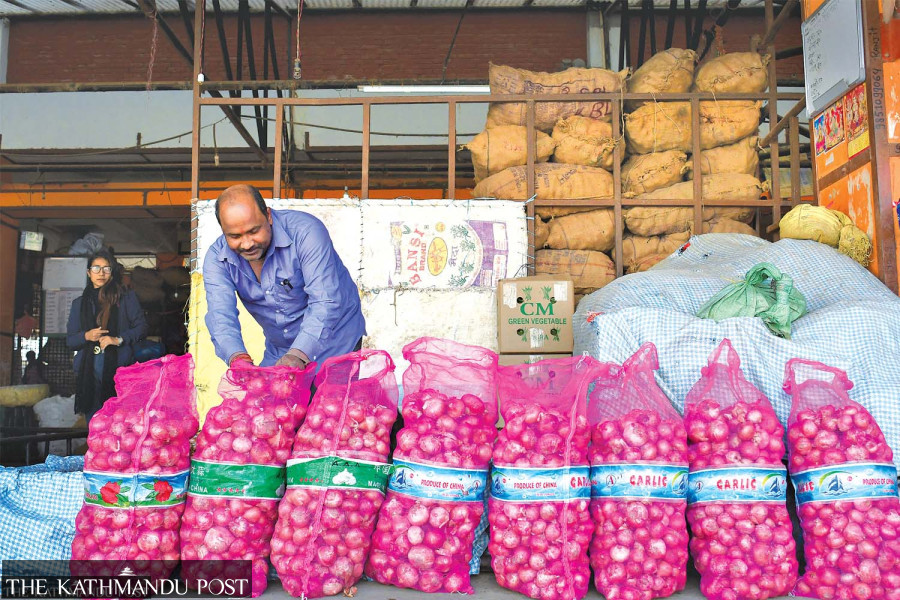Money
Onion disappears from market as India slaps export tax
Nepal imports almost all its onion requirement from India, and the tax has created shortages in the domestic market.
Krishana Prasain
The Kalimati Fruit and Vegetable Market in Kathmandu wiped onion off its price list on Tuesday after the staple vegetable disappeared from the market.
“No onion shipments have been delivered since Sunday, and the remaining stocks were sold out by Monday,” said Binay Shrestha, information officer for the country's largest produce bazaar.
Traders said onions suddenly became scarce after the world's largest exporter India slapped a 40 percent export tax on the vegetable to stem exports to neighbouring countries. The export duty will last till December 31, and is intended to cool inflation in vegetable products in India.
According to international media reports, the tax will help New Delhi dampen local prices ahead of key state elections later this year, but will force Asian buyers to shell out more, as other regional exporters have limited supplies.
Onion prices in India jumped 20 percent in a month, and the new season crop is expected to get hit by erratic weather. The export duty will make Indian exports less competitive, according to Reuters.
As Nepal imports almost all its onion requirement from India, the hefty export duty has created shortages in the domestic market. Traders say that the scarcity coincides with the start of Nepal’s festive season when onion consumption explodes.
The festival season is marked by endless feasting, and the spicy bulb is indispensable to local cooking.
After the new Indian tax went into effect, the wholesale price of onion soared to Rs78 per kg at the Kalimati market on Monday. The vegetable cost Rs54 per kg two weeks ago. The retail price of onion has crossed Rs100 per kg in Kathmandu Valley.
“The price may rise further. We cannot say how much,” said Shrestha.
India's move to stem exports has distorted the Nepali market with inflation headed towards the double digits this fiscal year, analysts said.
The southern neighbour first imposed a ban on wheat exports, and then extended the embargo to rice and sugar. Nepalis were immediately hit as prices shot up.
But some traders are hopeful that the onion shortage will not last.
“There were no deliveries during the weekend, which is Saturday and Sunday in India,” said Mohan Baniya, president of the Potato-Onion Import-Export and Wholesaler Association. “New shipments will arrive with 40 percent tax added to the cost,” he said.
Baniya said that 12-13 trucks laden with onions are scheduled to enter Nepal through Bhairahawa Customs on Tuesday. Each truck carries 21 to 31 tonnes.
“Supply will ease in Kathmandu Valley from Wednesday.”
Traders say that the new batch of onions will cost IRs13 per kg more. They were importing onions at IRs20 per kg before the new tax was imposed.
According to Baniya, onion may cost Rs75 per kg wholesale with the higher tax. He says Nepali traders import onions from Nasik, Indore, Kanpur and Gujarat in India.
On Sunday, the Kalimati market received 47 tonnes of onion, down from 85 tonnes on Saturday. On Friday, deliveries amounted to 107 tonnes.
Nepal imported 180,190 tonnes of onion worth Rs6.75 billion from India in the last fiscal year 2022-23, according to the Department of Customs. The country imported 47,563 tonnes of onion for Rs6.17 billion in the previous fiscal year 2021-22.
Nepal is almost totally dependent on imported onions from India as domestic production is negligible.
Onion prices doubled when Nepal imposed a 13 percent value-added tax (VAT) on it. The VAT was imposed on imported foods and vegetables for the first time as the tax-hungry government struggled to meet its annual revenue collection target.
The price of onions doubled from Rs16 per kg wholesale to Rs32 per kg after the budget announcement on May 29.
Potatoes, onions and other daily consumable farm products are supposed to be exempt from VAT under the Tax Act of 1996. But while preparing the new budget, the government amended the law through the Financial Bill 2023 and removed 170 goods from the tax-free list.
A variety of taxes totalling 23.5 percent are charged on potatoes, onions and other vegetables, fruits and food items—9 percent agriculture service charge, 1.5 percent advance tax and 13 percent VAT.




 8.54°C Kathmandu
8.54°C Kathmandu














